

We will use the term distress to refer to our stress responses that are negative in valence. Distress, then, is a negative cognitive interpretation of a potentially harmful biological response. Video: How Stress Affects Body. Journal: Psychological, Behavioural and Biological Determinants in Stress. Caregivers Need Support to Cope with Stress. The efforts and struggles of caregivers often go unnoticed, unappreciated and unrewarded.

It is an unenviable and stressful task providing care and emotional support for those who are physically challenged or stricken with abnormal behaviour caused by mental health issues. Still, caregivers strive on in sacrifice, out of love for recipients who are likely to be loved ones or family members. Many of them are unprepared and untrained for those responsibilities. They are drawn into performing that role because other choices are limited, unreliable or unsuitable. With work duties and job commitments of their own, having a domestic worker at home is preferred by most Singaporeans. However, an acceptable standard of care and attention given by domestic helpers cannot be assured in the absence of love, patience and understanding when they have to face the erratic or aggressive behaviour of those under their charge. There are courses conducted by several organisations in Singapore. An Individual's Experience on Caregiver Stress.
SINGAPORE - For two years after her mother suffered a stroke that led to dementia, Ms Jasmine Chua got only seven hours' sleep a week.

Her mother kept waking her up to talk - never mind that Ms Chua had a busy job in the daytime as a clinic assistant. The lack of sleep left her frustrated. She recalls: "You've to leave everything behind and concentrate on your work. Caregiver Stress Fact Sheet. Journal: Caregiver Stress vs Non Caregiver Stress. Journal: Stress and Coping Model for Caregivers of Older Adults. Journal: Stress, Coping and Interventions in Dementia and Caregiving. Caregiver Stress Poster. Caregiver Stress. Common Causes of Caregiver Stress. If you’ve been taking care of a chronically ill spouse or elderly parent, you may be feeling the effects of caregiver stress.

If you’re feeling frustrated or overwhelmed or are experiencing increased stress symptoms, you’re not alone. Providing this type of care can place a great deal of pressure on a person, and caregivers are often surprised by the amount of stress they feel. Here are just some of the pressures that many caregivers face. Fear or Uncertainty If you’re in the position of caring for someone with cancer or another serious disease, you’re probably also dealing with concerns for your loved one’s future. Shift in Roles. Caregiver's Experience on Causes of Caregiver Stress.
SINGAPORE: When a loved one becomes a patient at home, it can take a toll on the family, especially the primary carer.
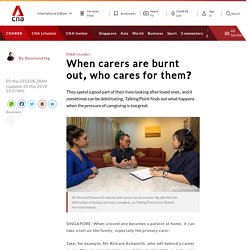
Take, for example, Mr Richard Ashworth, who left behind a career as an office manager to take care of his adoptive father, John, nine years ago. His father, 86, suffers from a host of age-related health issues, including dementia and colon cancer. Not only have these conditions left his elderly life in tatters, they have also taken their toll on his son’s mental health. “I’d get so frustrated — how to handle him when he started screaming?” Recounted the 65-year-old. “I’d start arguing with him also: ‘Why are you doing this to me? A Caregiver's Account on Stress Causes. SINGAPORE: Like any other parent, Mr Peter Tay wanted his three daughters to do well.

But when his third daughter, Priscilla, was diagnosed with Attention Deficit Hyperactivity Disorder (ADHD) and mild learning disabilities just before she began primary school, Mr Tay struggled to accept the situation. “Parents basically want their kids to be high-flyers,” he said. “And my two older daughters had done fairly well academically.” Caregiver Stress: Causes and Warning Signs. Leawood, KS – Caring for an aging loved can be difficult for the caregiver.
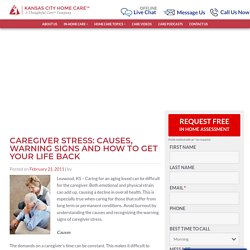
Both emotional and physical strain can add up, causing a decline in overall health. This is especially true when caring for those that suffer from long term or permanent conditions. Sources of Caregiver Stress. Caregivers are those that care for others because they either can’t care for themselves or need assistance to carry out everyday tasks.
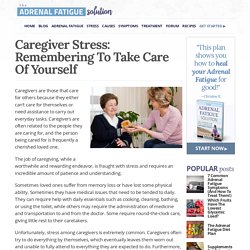
Caregivers are often related to the people they are caring for, and the person being cared for is frequently a cherished loved one. Video: Family's Experience with Caregiver Stress. Reasons for Caregiver Stress in Developmentally Impaired Child. Caregiver stress can arise from caring for a child with developmental disorders such as autism and intellectual disability.
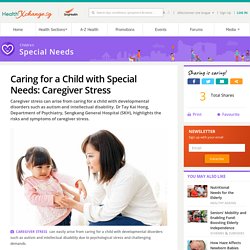
Dr Tay Kai Hong, Department of Psychiatry, Sengkang General Hospital (SKH), highlights the risks and symptoms of caregiver stress. Autism spectrum disorder and intellectual disability in children are developmental disorders that have been on the rise. This is partly due to better recognition of the conditions. Special needs children in Singapore Locally, about 1.4% of all children under the age of 4 were diagnosed with varying degrees of developmental issues and needs. Most parents do not plan on becoming “special parents” or caregivers of children with special needs. This was shared by Dr Tay Kai Hong, Associate Consultant, Department of Psychiatry at Sengkang General Hospital (SKH), a member of the SingHealth group. Importance of Recognizing Caregiver Stress. Signs of Caregiver Stress and Burnout. What is caregiver burnout? While caring for a loved one can be very rewarding, it also involves many stressors. And since caregiving is often a long-term challenge, the emotional impact can snowball over time.
You may face years or even decades of caregiving responsibilities. It can be particularly disheartening if you feel that you’re in over your head, if there’s no hope that your family member will get better, or if, despite your best efforts, their condition is gradually deteriorating. If the stress of caregiving is left unchecked, it can take a toll on your health, relationships, and state of mind—eventually leading to burnout, a state of emotional, mental, and physical exhaustion.
That’s why taking care of yourself isn’t a luxury, it’s a necessity. How to Identify and Manage Caregiver Stress. Learn Symptoms of Caregiver Stress. Alzheimer's caregivers frequently report experiencing high levels of stress.
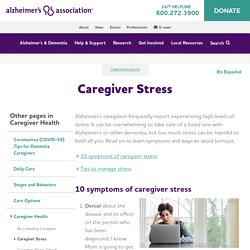
It can be overwhelming to take care of a loved one with Alzheimer's or other dementia, but too much stress can be harmful to both of you. Read on to learn symptoms and ways to avoid burnout. Denial about the disease and its effect on the person who has been diagnosed. I know Mom is going to get better. Anger at the person with Alzheimer’s or frustration that he or she can’t do the things they used to be able to do. If you experience any of these signs of stress on a regular basis, make time to talk to your doctor. Video: Symptoms of Caregiver Stress. 9 Warning Signs Of Stress For Alzheimer's Caregivers. By Emily Gurnon, Next Avenue Contributor Do you go to bed every night exhausted, and wake up with a sense of dread?
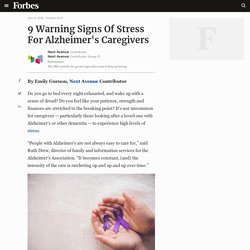
Do you feel like your patience, strength and finances are stretched to the breaking point? It’s not uncommon for caregivers — particularly those looking after a loved one with Alzheimer’s or other dementia — to experience high levels of stress. The Three Types of Stress. Understanding stress can help you know more quickly when you need help. Stress is our built-in response to danger, a surge in hormones as we choose between fighting, fleeing, or freezing. The danger may be real or imagined, immediate or farther away; our bodies don’t know the difference. According to the American Psychological Association, the three types of stress — acute stress, episodic acute stress, and chronic stress — can all make us feel out of sorts or even ill, but chronic stress is often ignored. article continues after advertisement Acute Stress.
Your heart might race and your blood pressure might rise. Other possible symptoms include irritability, anxiety, sadness, headaches, back pain, and gut problems. Types of Stressors (Eustress vs. Distress) Types of Stress and Their Symptoms. Will Joel Friedman, Ph.D. is a seasoned clinician with experience working with adults, couples, families, adolescents and older children since 1976.
His aim...Read More Given that stress has been linked as a co-factor in 95% or all disease processes, a keystone of holistic, alternative health and healing is learning how to effectively manage stress. This learning process begins with recognizing or identifying four specific types of stress affecting you and how these stressors (that is, what demands a change from you) are showing up or manifesting as symptoms in your life. Three kinds of Caregiver Stress: Role strain, Personal Strain and Worry about Performance. Caregiving for the elderly with dementia is a role that is set to increase in demand. In its last study in 2005, the Alzheimer’s Disease Association Singapore found that there were 22,000 seniors (aged 65 and above) with dementia. These numbers are set to increase to 53,000 in 2020 and 187,000 by 2050, said Associate Professor Lim Wee Shiong, Senior Consultant with the Department of Geriatric Medicine, Institute of Geriatrics and Active Ageing, Tan Tock Seng Hospital (TTSH).
In Singapore, a large part of the caregiving responsibility falls on adult children, followed by spouses and grandchildren. Some of these adult children may not necessarily provide direct care but they are the decision-makers. Many of these adult caregivers are also sandwiched between having to look after their parents with dementia and their own children. Related: Dementia Role Reversal: Who is the Carer Now? The Three Types of Caregiver Stress - Complex Child. Caregiver stress is something we hear about all the time as parents of children with special needs. Though the term is used for all caregivers, it is usually when a parent is the caregiver that we tend to deny it happening. Caregiver stress can be defined in three main ways, and if it is not remedied, then it can become burnout. We will go through the three main ways in hopes that you can recognize them in yourself and intervene before stress progresses to burnout.
Video: Types and Causes of Stress. 4 Types of Stress. Learning Objective. Main Types of Stress. Journal: Caregiving Stress and Depressive Symptoms. 10 Stress-Related Health Problems That You Can Fix. Jay Winner, MD, author, Take the Stress out of Your Life; founder and director, Stress Management Program, Sansum Clinic, Santa Barbara, Calif. American Diabetes Association. American Heart Association. Blumenthal, J.
Illnesses Caused by Stress. Elevated stress levels can even raise your blood cholesterol. That is why it is important to check blood pressure regularly. If your blood pressure is elevated, see your doctor to find out why. If it is due to stress, take steps to deal with the underlying causes. 10. Singapore Spends $3.1 billion on Stress-related Illnesses Annually.
SINGAPORE - A study has found that Singapore spends about US$2.3 billion (S$3.1 billion), or 18 per cent, of its total healthcare expenditure on stress-related illnesses annually. This put the nation's proportion of expenditure on stress-related illnesses second-highest out of the nine regions studied in the report, coming just 0.8 per cent behind Australia's 18.8 per cent. Video: The Long-term Effects of Stress. Diseases Caused by Stress. Caregiver Stress Syndrome. Quiz: The Stress Level. Questionnaire: Caregiver Self Assessment.
The Caregiver Health Self Assessment Questionnaire was originally developed and tested by the American Medical Association. Screening Tool: Zarit Burden Interview 12 (For Care Professionals) Quiz: Stress and Anxiety. Is there too much stress in your life? To find out, take this quiz, adapted from a scale developed by Peter Lovibond at the University of New South Wales. For the first 16 questions, please indicate how much each statement applied to you over the past week. Answer the questions as honestly as possible; there are no right or wrong answers. Journal: Coping with Caregiver Stress. Journal: Stress and Coping Strategies. Stress Management Tips. While it may seem like there’s nothing you can do about stress at work and home, there are steps you can take to relieve the pressure and regain control. 10 Easy Ways to Manage Stress. Everyone experiences stress as a result of the life demands that we manage from day to day.
Whilst stress can motivate us and help us achieve our goals, when experienced at high levels or for long periods of time it can have a negative effect on your health. While it may not be possible to eliminate all the stresses in your life, you could seek out ways to manage stress in your daily life. Here are 10 easy ways that could help you in managing stress. Caregiving Stress and How to Cope with It. 14 Practical Ways to Relieve Caregiver Stress. 8 Essential Caregiver Coping Strategies. 4 things To Alleviate Caregiver Stress. Strategies for Coping with Caregiver Stress. Coping With Caregiver Stress. How to Prevent Caregiver Stress. Presentation: Tips for Coping with Caregiver Depression and Stress. Video: De-stress from Caregiving. Video: TEDTalk on How to Relieve the Stress for an Aging Parent. Stress Relief Games.
Calm & Stress Relief Online Activities. Peaceful Soothing Music - Stress Relief. Stress Management. Ways to Reduce Stress for Senior Caregivers. Thoughts on Coping Strategies. Counselling Services by Singapore Counselling Centre. Hotlines Available to Assist with Caregiver Stress Coping. Initiatives to Assist in Caregiving.
Need Help as a Caregiver? Here's Where You Can Turn To. Caregiver Support Group – Alzheimer's Disease Association. Caregiver Support Groups in Singapore. Caregiver Support Schemes.